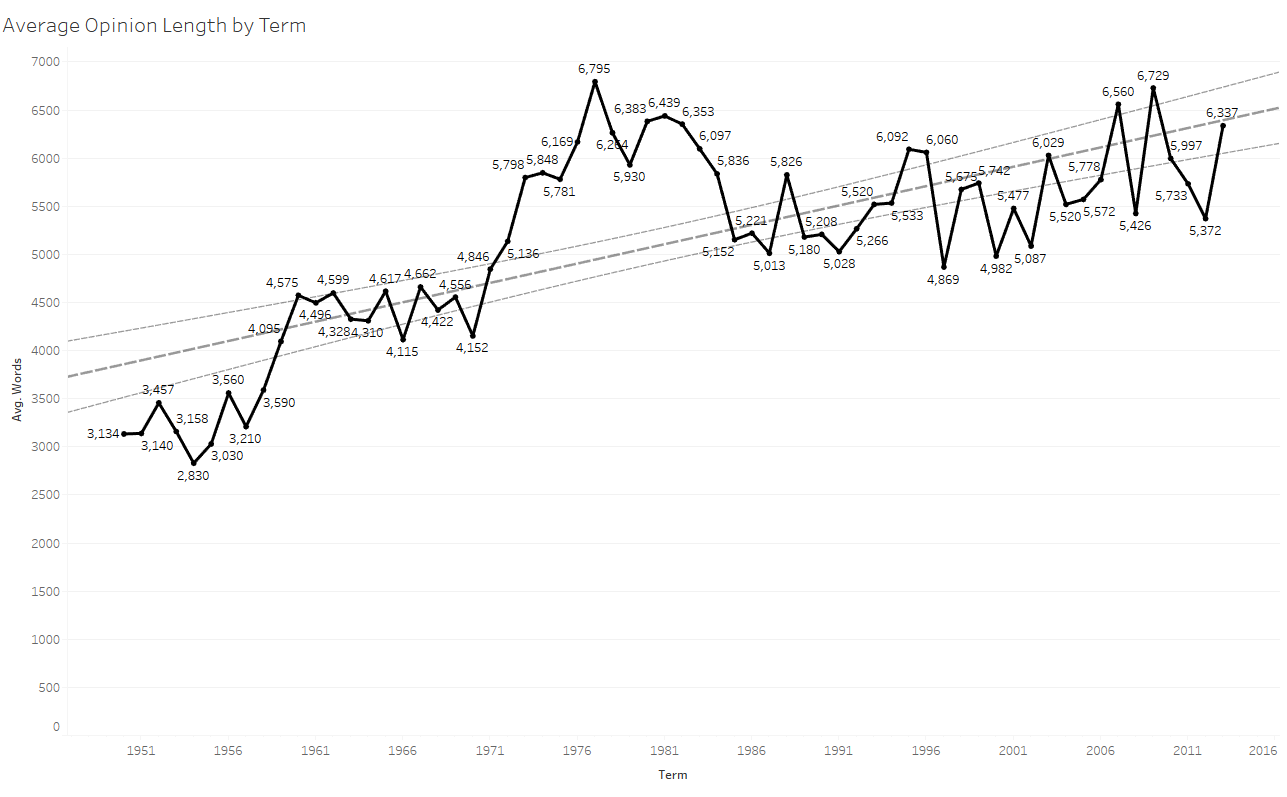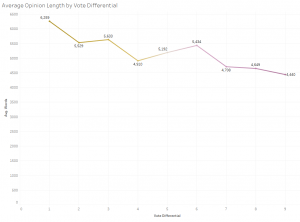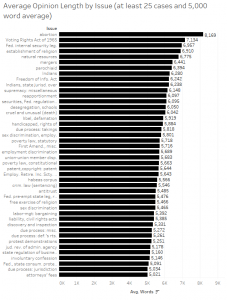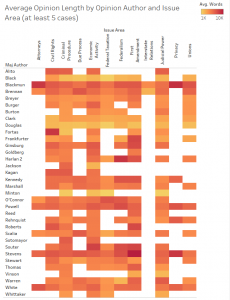Empirical SCOTUS: An opinion is worth at least a thousand words (Corrected)


Supreme Court opinions come in all different shapes and sizes. Some are short and sweet, and others are dense, long, and hard to follow. Some reasons behind relative opinion length are obvious. Even though the justices tend not to grant cases with facile solutions, certain cases are particularly complex and involve extensive fact patterns. Along with the superficial reasons that define an opinion’s length, other factors lie below the surface. Justices have distinct writing patterns. Some believe in brevity, while others are quite verbose.
Strategically, opinions vary in length depending on the receptivity of other justices. If the chief justice is in the majority, the chief delegates majority opinion authorship to any justice in the majority. If the chief is not in the majority, this delegation is performed by the most senior justice in the majority. Once an opinion has an author, though, that justice must maintain the majority coalition. Depending on the text of the opinion, certain justices may be persuaded to join with the majority, while others might decide that their views more closely align with those in a dissent. Majority opinion lengths vary as authoring justices aim to appease and maintain a majority, yet to not dissuade members of majority from staying on.
Just this term we have seen a variation of over 5,000 words in opinion length between the Supreme Court’s longest majority opinion, Jennings v. Rodriguez, and the shortest opinion, Murphy v. Smith. At 8,824 words, though, Jennings doesn’t hold a candle to last year’s longest signed majority opinion in Cooper v. Harris, which runs to 10,773 words.
The average number of opinion words changes over time as well. This post tracks signed majority opinions written between 1951 and the end of the 2013 term; the average majority-opinion length by term is displayed below along with a trend line and 95-percent confidence interval.

As this graph shows, the mean majority-opinion length steadily increased from under 4,000 words to over 6,000 words across this period.
Building on the importance of the majority coalition, we can also examine opinion length depending on the difference in the size of the Supreme Court’s majority versus the number of dissenting voters.

Perhaps not surprisingly, opinions in the most closely divided cases averaged significantly more words than unanimous opinions. This trend was relatively consistent for the increments in between.
The difference in majority-opinion size is also evident when clustering opinions by certain characteristics. Using the Supreme Court Database, I grouped opinions according to coding by issue. To ensure that the correlations were not based on idiosyncratic instances, I only used issues coded in at least 25 cases. Issues with opinions that averaged at least 5,000 words are displayed below.

Based on the issue coding, the central issue in the longest-average opinions is abortion. Abortion opinions like Roe v. Wade and Planned Parenthood v. Casey are long not only in an effort to please a majority coalition, but also to explain the nuances of what makes certain behavior legal and certain behavior illegal. The complexity of abortion law is also evident in the constantly changing state laws (e.g., the recent legislation in Mississippi) that attempt to track the boundaries under the Supreme Court’s interpretation of the Constitution.
Cases dealing with facets of the Constitution, such as the establishment clause, also involve contentious areas in which jurisprudence is constantly evolving to the strictures of the law (and its interpretation). Cases dealing with complex issues like mergers also fall toward the top of the word length list. Also, cases with issues like natural resources, which often examine agencies’ interpretations of statutes, lead to lengthy opinions.
Even though the Supreme Court’s examination of agencies’ interpretations often leads to extensive majority opinions, it does not always do so. The following figure looks at the difference in opinion word length depending on the agency whose decision the court ultimately examined.

Because cases that deal with natural resources average such a high word count, it follows that cases initially reviewed by the Environmental Protection Agency fall high in this figure. This can be compared with opinions in cases initially reviewed by the Internal Revenue Service, which, although they have been somewhat common before the Supreme Court in certain years, do not tend to be particularly lengthy.
Moving back to the issue of opinion assignment, the assigner may have an influence on opinion length often related to the majority coalition and issue in the case.

For that reason, two associate-justice opinion assigners averaged higher word counts than any chief justice over this period. Justices John Paul Stevens and William Brennan tended to vote alongside the more liberal justices during the years when Warren Burger and William Rehnquist were chief justice. In accordance with the notion that recent opinions tend to be longer than older ones, opinions assigned by Chief Justice John Roberts are the next longest on average.
But perhaps more interesting than looking at majority assigner is the figure displaying the authoring justices’ relative opinion lengths.

Interestingly, Stevens also tops the list that ranks justices by their average opinion length. Stevens, who was also the most common dissenter while on the court, was often the liberal voice on a conservative court. Justice David Souter, another typically liberal justice who sat alongside Stevens, comes next on this list, followed by Justice Harry Blackmun, who authored, among other opinions, the 11,787-word abortion opinion Roe v. Wade. On the other end of the spectrum, justices who sat on the court near the middle of the 20th century dominate the bottom of this figure.
Looking at the justices with a finer-toothed comb, the next figure breaks down average opinion length by justice and by the general case area. This figure only focuses on instances when justices authored at least five majority opinions in a given issue area.

This figure shows, for instance, that Blackmun’s opinions dealing with attorneys averaged over 10,000 words. This set includes Blackmun’s 11,526-word opinion in Bates v. State Bar of Arizona. Conversely, Justice Antonin Scalia’s federal-tax opinions, such as the 2,744-word opinion in Commissioner of Internal Revenue v. Bollinger, averaged on the short end of the length spectrum.
One of the more interesting questions that can be answered with this data is which signed opinions were the lengthiest across this period. The following figure has the answer.

Only two signed opinions, those in McConnell v. Federal Election Commission and Communist Party v. Subversive Activities Control Board, were over 40,000 words long. This also shows that opinions closer to 25,000 words were much more common than much longer ones. Two Louisiana-boundary opinions are both in the top 11. Stevens, the justice with the longest opinions on average, has two in this figure, McConnell and Hamdan v. Rumsfeld. Interestingly, so do Justices Felix Frankfurter, John Marshall Harlan and Potter Stewart. The only sitting justice with an opinion in this figure is Justice Anthony Kennedy with his opinion in TBS v. Federal Communications Commission.
If the Supreme Court continues to have smaller and smaller caseloads each term, we may continue to see opinion lengths grow. Although the opinions this term have by no means been short (they are 4,876 words long on average), we are fewer than 20 signed opinions deep at this point in the term. The more contentious and lengthy decisions tend to come in the latter part of the term. Last term’s longest opinion, in Cooper v. Harris, was released in May. We may expect to see the average for this term increase by several thousand words, but this will only be possible if the justices write much longer opinions on average for the remainder of the term.
This post was originally published on Empirical SCOTUS.
An earlier version of this post indicated that the word count for Cooper v. Harris was 21,625, not 10,773.
Posted in Corrections, Empirical SCOTUS
